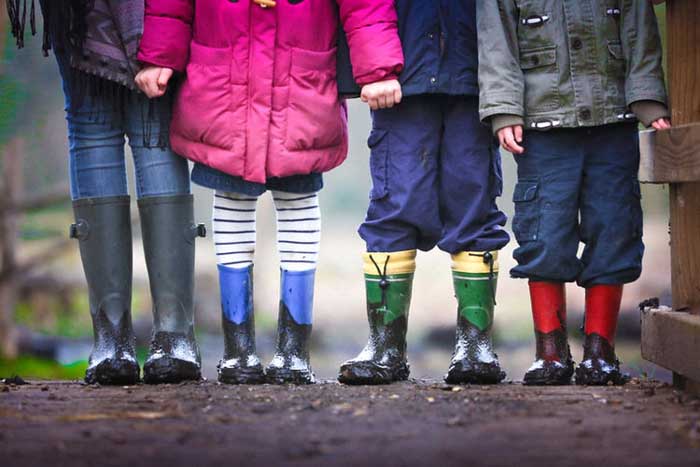Stop Comparing Your Child to Other Kids – And Here Is Why
We have known that comparisons are at best worthless, at worst insidious, but there is something about them that makes them awfully tempting. Without even noticing, we indulge in comparing every day, and our children are among the strongest incentives for us to do it. Here are some examples of how we compare our kids to others:
• Immaculately dressed, beautifully posing kids on Instagram – and your tousled ones who can’t resist making faces for their photos
• Sportively shaped herculeses – and your limb-weak progeny
• Honor students – and your student of humble credit
• The calm, sophisticated child – and your recalcitrant and obstinate adolescent
• Almost paragon kids – and your imperfect ones
What pushes parents into comparisons?
No parent can surely be found who wouldn’t wish to see her young one reaching out for success upon success, but this isn’t attained by comparisons. While parents may delude themselves that, employing plentiful comarisons to others, they encourage the child, actually he or she is more likely to resent pitting them against those who seem to be better; thus, it might result in undermining their confidence rather than building it.
What issues arise when parents overindulge in comparing
The whole idea that drives parents to compare their child to others lies in attempting to stir the child into competing with his peers. It can appear to be the best means of forcing latent faculties and talents to blossom as the adolescent is supposed to strive to do one better than the next kid. But it isn’t the only incentive, and what’s more, not so potent as it can be presumed.
What goes against comparing is the notion that every person is unique bestowed with individual gifts. These gifts take their own time to mature, and when constantly addressed, especially with the desire to play down the young one’s performance, they may grow thwarted and break down on the child in the end. So, stimulation is actually a subtler process, requiring awareness of certain points that are elucidated further.
Each young person is unique, meant to be independent-thinking
Good parents always hear their kids out knowing they should figure out how they feel and what they think about things happening in their lives. Besides, they should work out their individual expressions of likes and resentments, learn to take advice from their thoughts and concepts. They should embrace critical thinking which will enable them to arrive at right decisions and help enter into the state of mutual respect and affection with other people.
Children are more than flowers decorating your union
Little ones do not make a happy addition to your family to delight in and present to others as your major step forward. This sort of attitude tends to set up sky-high goals and is bound to lead up to major disappointments not only for parents and children alike, but for children’s future children as well. As individuals, kids should be held in respect and affection and be sure they are understood.
What makes child comparison so destructive
Parents who are aware of the untowardness of comparisons and generally shy from it can still steer round to it unconsciously. It definitely looks as if comparing were an inescapable inborn human tendency. Anyway, this yendency had better be curbed – your kids will think any comparison is negative and demeaning, and will react correspondingly. Listed below are some unwelcome outcomes:
1. Sibling rivalry can flare up
Parents who have fallen into the habit of comparing siblings can find that it brings about rivalry and subsequent teasing, offensive or aggressive behaviors, quarrels and fights.
2. Distancing
Feeling subjected to endless comparisons to others, the child grows more insecure and, not wanting to have more of the same, he or she will try to keep distance between them and you. It is not good for proper development and your relationship.
3. Smothering talents
A gifted child, finding that their talent serves ground for ceaseless comparing, can be discouraged from evolving their potential and abandon the activity altogether.
4. Developing of indifference
A kid is quick to assume that his parents may be appreciating other children more; if so, he may lose any interest in playing along with his parents‘ wishes and pleasing them.
5. Becoming socially passive
Constant comparing barbed with jabs, jokes and taunting can make the child withdraw and cut off all social interaction when you are around.
6. Bringing down self-confidence
Getting compared against her friends wears down the feeling of self-worth, it being slowly substituted for insecurity. When it happens, the child’s performance begins to deteriorate.
7. Self esteem weakens
Development slows down as the child loses the belief that she can acquit herself well; the notion that she won’t ever fulfil her parents‘ expectations makes her less enthusiastic as time goes by.
8. Life becomes stressful
It is up to parents to make sure that their child(ren) do not strive under too much pressure and their lives are not cluttered. Get to know the things that are troubling them and discuss their problems to get them sorted out.
Always accentuate the positive
Since we are given to comparing, and it’s only human to juxtapose things and people, parents should take pains to hold the tendency in check as regards their kids, knowing that liberal indulgent in child comparing can be very destructive.
In place of comparing, lay stress on their achievements, which will take care of developing their individual fortes and gifts. Let them evolve pride in what they are. While comparisons are often negative, encouragement is always positive. You will drive your adolescent to new successes by delighting in recent ones, making them more confident and aspiring.
This is a major parental job which, if initiated early on, conduces to the growth of belief in oneself and confidence that make a good foundation for adult life. So this message must be powerful enough. Children should feel proud of their performance more than of their successes. Their motivation should come from within, not depending on other people’s values or praises. Let them grow up free of the habit of comparison.





